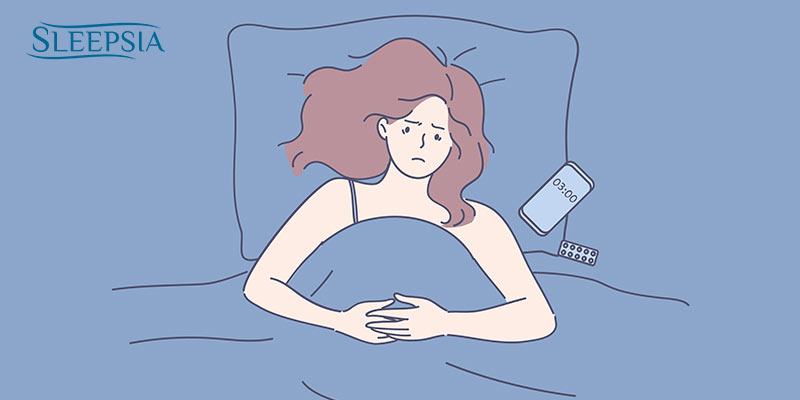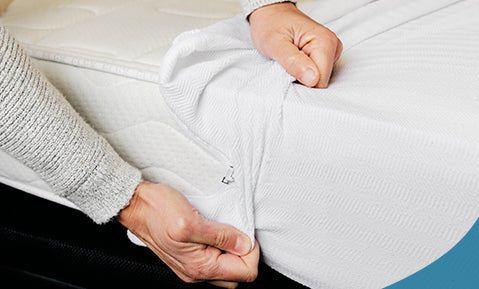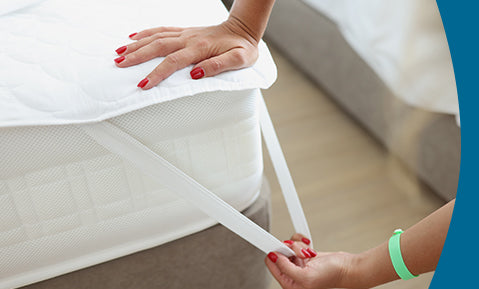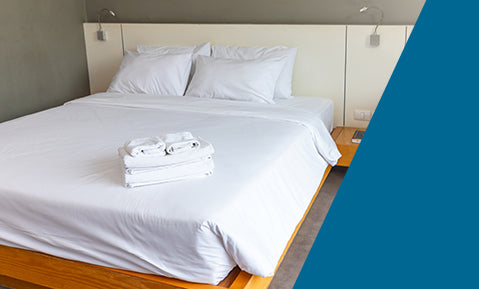
Bad sleep leads to bad performance, which in turn leads to a bad life. Just try to remember the days on which you laid down on your bed and fell asleep immediately.
But on some days, and sometimes on days on end, you may simply lie on your bed and wait for sleep to take over. These, indeed, are the bad days.
Impact of Bad Sleep
Lack of sleep can lead to the following:
- Challenge in maintaining focus and attention
- Higher chances of making errors
- Fuels irritability, stress, and anxiety
- Amplifies emotional reactions
By impairing your ability to focus and think logically, sleep deprivation ruins your performance and deteriorates your quality of life.
To help you sleep faster and better, I’ve compiled a list of healthy sleep tips. But first, let’s understand sleep.
Circadian Rhythm, Explained!

Circadian rhythm keeps track of all the activities happening inside your body in a 24 hour period.
Popularly known as the inner timekeeper, it ensures timely release of hormones to optimize your performance and sleep.
Here are a few examples of circadian rhythm in our body:
- Sleep-wake cycle
- Digestion
- Immune system function
- Hormonal activity
Suprachiasmatic nucleus (SCN), located in the brain and connected directly to the eyes, maintains the circadian rhythm.
Your eyes process light and send relevant information to SCN, which tells the cells to act according to the time of the day, maintaining the 24-hour cycle.
As our sleep is a direct result of a 24-hour cycle, it is crucial to maintain a proper 24 hour schedule to fall asleep easily.
Let’s look at what you can do if you can’t fall asleep:
1. Create the Perfect Environment
A lot depends on the environment in which you sleep. A noisy environment prevents your mind from relaxing and hinders the release of melatonin.
But it's not only about noise but also about comfort. An unrelaxed body prevents the brain from relaxing.
So here’s what you must focus on:

Reduce Noise in your surroundings
Although a rare problem, noise impairs not only your ability to get a good night’s sleep but also your health.
Being a sensitive sleeper can further exacerbate the problem.
Here are a few things that you can try:
- Earplugs: they are an affordable, common and effective solution that prevent a lot of the noise from reaching into your ears.
- White noise machines: these machines use noise to mask the noise coming from the environment.
- Noise-cancelling headphones: they’re an expensive but effective option that enable you to listen to music or podcasts while you drift off to sleep.
But if your partner is the source of the noise, then things can become quite difficult. Apart from using earplugs or noise cancelling headphones, you should discuss the problem with your partner.
Note: Loud snoring can be an indication of sleep apnea, a serious medical condition.
Get Suitable Mattress and Pillow
Depending on your sleep position and posture, you need to select a mattress and pillow that provide good support without being too rigid.
If you aren’t using correct pillows and mattresses, then you’ll experience:
- Pain in neck, back, and shoulder joints
- Fatigue
- Irritability and anxiety
- Lethargy and sleepiness
Here are some pillow and mattress recommendations on the basis of your sleeping position:
Table: Pillow Recommendations
|
Sleeping Position |
Pillow Loft |
Pillow Firmness |
Pro Tips |
|
Back sleepers |
4-6 inches |
Medium Firm |
Place a pillow below your knees |
|
Side Sleepers |
5-7 inches |
Firm |
Place a pillow between your knees |
|
Stomach Sleepers |
3 inches or less |
Soft |
Place a pillow beneath your lower abdomen |
Adhering to these recommendations can require trying out different pillow sizes and fills. However, I’d suggest going with a shredded memory foam pillow, as it is:
- Adjustable: You can adjust the loft and firmness of the pillow by altering the amount of memory foam inside the pillow cover.
- Supportive: Memory foam cradles your neck while providing it proper support.
- Durable: As it is a very dense material, memory foam prevents dust buildup and retains its shape throughout its lifetime.
- Hypoallergenic: it rarely causes irritation or allergies.
Note: it is advised not to sleep on your stomach, as it can lead to lower back pain.
Like your pillow, your mattress should provide good support without forcing too much pressure on your delicate joints.
Table: Mattress recommendation
|
Sleeping position |
Mattress firmness |
|
Back sleepers |
Firm: to maintain proper alignment of spine |
|
Side sleepers |
Medium-firm: to relieve pressure from lower back and shoulders |
|
Stomach sleepers |
Firm: to ensure that your back doesn’t sink into the mattress |
For mattresses, you can select among the following materials:
- Innerspring: it contains springs inside the mattress to provide both firmness and bounce. However, innerspring mattresses are rarely used these days.
- Foam: these are a very affordable option, especially the ones comprising memory foam. But as memory foam retains body heat, these mattresses aren’t suitable for those living in hot climates.
- Hybrid: these contain both a coil spring base and memory or latex foam.
- Waterbed: a mattress filled with water and intended for medical therapies.
Of course, there’s no easy way out here. You may have to try different materials to find the one that best suits your body type.
And purchase sheets and pillows covers that are both hypoallergenic and comfortable.
Air Quality and room temperature
The cooler, the better!
As you fall asleep, your body temperature falls quickly. So heat from the environment or your body can disrupt your sleep.
A room temperature of 15.6 to 22.0 degrees Celsius (60 to 70 degrees Fahrenheit) is considered ideal for sleep.
Apart from temperature, air quality is an important factor that has an effect on your sleep, with fresh air and ventilation promoting better sleep.
2. Relax the mind

More important than creating the perfect external environment, it is essential to focus on the inner environment: your mind.
When your mind experiences stress and anxiety, it releases cortisol and adrenaline, both of which impede your ability to fall asleep.
Overthinking, also, best known as creating problems that are never there - David Sikhosana
While some people recommend counting or focusing on breathing, the banality of these techniques can be mind numbing.
So here are a few modern techniques that’ll help you relax your mind and fall asleep fast.
4-7-8 breathing technique
Developed by Dr. Andrew Weil, 4-7-8 breathing technique is perfect for people beginning with relaxation techniques.
By helping you control your breathing effectively, this technique calms and relaxes your mind.
To practice 4-7-8 breathing technique, follow the steps provided below:
- While laying down on your bed, part your lips a little.
- Exhale through your mouth while making a whooshing sound.
- Inhale through your nose for 4 seconds.
- Hold your breath for the next 7 seconds.
- Exhale again though your mouth while making a whooshing sound for the next 8 seconds.
- Repeat this cycle 10 times or until you feel completely relaxed.
Mindfulness meditation
We, as humans, are judgmental creatures. We judge movies, food, and the actions of other people. But more importantly, we judge our thoughts, and then judge those judgements.
It’s a never ending cycle that overloads the brain and creates stress in our life, stress that sometimes isn’t even based in reality.
Mindfulness, a popular meditation practice, makes you more impervious to thoughts. It simply requires you to focus on your breath.
A study by Sara Lazar, a psychology professor at Harvard Medical School and a neuroscientist, is one of several studies that documented the ability of mindfulness meditation to increase brain region and gray matter linked to:
- Memory
- Sense of self
- Regulation of emotions
Here’s how you can practice mindfulness meditation:
- Sit or lay down in a comfortable position.
- Take a few deep breaths.
- Bring your focus to your breath. Notice one of the two:
- Air going in and out of your nose
- The rise and fall of your chest as you breathe
- When your mind wanders, you simply note the thought or emotion, put a name to it, and bring your focus back to your breath.
As you become more aware of the thoughts and emotions that are troubling you, you’ll become better equipped at dealing with them. After all, awareness is the first step towards change.
Here are a few guided meditations that I’ve found very helpful:
Progressive muscle relaxation

Anxiety and stress can have physical symptoms, especially muscle tension. So this technique focuses on contracting and relaxing a group of muscles at a time to relax the mind.
Here are the steps to practice progressive muscle relaxation:
- Focus on your breathing for 10-20 seconds.
- While you take a deep breath, tense the first muscle group for 5-10 seconds.
- As soon as you start to exhale, completely relax the muscle group.
- Repeat the same with another muscle group after 10 seconds.
Muscle groups that you can focus on:
- Biceps and triceps
- Shoulders
- Quads and hamstrings
- Glutes
- Forehead
- Chest
- Upper Back
Grounding
Anxiety activates your sympathetic nervous system and your body’s fight-flight-freeze response.
Although a natural and essential response, anxiety can often be provoked by thoughts and stress. To counter it, you can rely on grounding: a technique that activates your parasympathetic nervous system and calms your mind.
Grounding requires you to focus your five senses one at a time. When your mind realizes that there’s no actual danger to you, the anxiety disappears.
Here’s a sample exercise that may help you:
- Lay down on your back.
- Take a few deep breaths and close your eyes.
- Resume normal breathing and focus on it for some time.
- Now, try the grounding technique.
Listen to guided sleep hypnosis sessions
Hypnosis isn’t what you see on television. It is an extension of meditation, in which, apart from breathing, you also focus on imagining different scenarios that help you relax.
Journal
If you feel like intrusive thoughts are encroaching upon your mind time and time again, then you should keep a journal.
Here are some benefits of keeping a journal:
- Prevents overthinking and clears your mind
- Keeps you closer to your core values
- Helps to identify anxiety provoking thoughts
Here are a few journal prompts with which you can get started:
- What thought keeps me from focusing on the present?
- What advice would I give to someone going through the same situation?
- What are the things that are within my control?
- What are the core values that I want in people around me?
- Write about the people who love you but who you’ve ignored?
- What would it feel like to lead a fight against an invading alien species?
Journaling will calm your mind and minimize cognitive distortions.
Read a book
There’s nothing better than absorbing knowledge while your brain gets tired and drifts into sleep. Reading also improves your focus and memory muscle.
So why not simply read a book while lying down on your bed.
If you don’t like to read, then listen to an audiobook or a podcast.
You can find free audiobooks and podcasts on:
- OpenCulture
- DigitalBook
- Spotify
- Google Podcasts
Even if your mind keeps wandering, remember that it’s normal. When you expect your mind to wander, you don’t become frustrated and, instead, accept it as natural.
3. Follow a strict sleep schedule

It may be difficult at first, but it is essential. Developing a strict sleep schedule helps your body in better maintaining the circadian rhythm.
Limit device usage
Unlike x-rays and UV rays, blue lights are visible to our eyes.
While emitted naturally by many sources such as the sun and fluorescent and incandescent light bulbs, blue light exposure has significantly increased as a result of light-emitting diode (LED) technology.
While red light signals to your brain the end of the day, blue light implies that the day is ongoing.
According to research, exposure to blue light in the evening hinders the body’s ability to release melatonin.
So it is recommended that you avoid using devices at least an hour before heading to bed.
Dim the lights
Dark environments are conducive to melatonin release in our brain, and bright lights promote wakefulness.
It’s simply a result of our circadian rhythm, which is connected to our vision. When we sense light, our brain triggers wakefulness.
So sleep in completely dark environments or simply lower the brightness of the lights.
Use a modern alarm app
Alarm applications have evolved for the better.
For Apple users, I’d recommend ‘Rise Alarm Clock,’ which offers a user interface in multiple languages and gentle alarm sounds. You can even select songs from your iTunes playlist as the alarm tune.
For android users, I'd recommend Alarmy, which provides multiple disabling modes such as:
- Typing
- Step
- Photo
- QR/Barcode scan
- Math
Users can easily generate a QR code to streamline various tasks, such as file sharing or website links.
Or simply use a normal alarm clock but keep it far away from your reach.4. Follow healthy habits during the day
It’s not just before sleep that you need to employ healthy habits. Following good habits throughout the day will both enhance your productivity and help you fall asleep fast.
Here are some things that you must do during the day:
Workout regularly
If you tire out your body during the day, it will become easier to fall asleep at night.
According to Charlene Gamaldo, M.D., medical director of Johns Hopkins Center for Sleep, “We have solid evidence that exercise does, in fact, help you fall asleep more quickly and improves sleep quality.”
Apart from tiring out your body, it can reduce feelings of depression and anxiety.
But because of quarantine rules or a busy schedule, you may find it difficult to hit the gym. However, you can rely on at home workouts to get in the required amount of exercise:
Other tips
Here are a few other tips to fall asleep fast:
- Try essential oils and scented candles.
- Avoid alcohol, caffeine, and spicy food close to bed.
- Avoid electronics close to bed.
- Wind down at least half an hour before bed.
Sleeping without a sleep schedule
While most of us can maintain a regular sleep habit, some can’t because of work. If you can’t maintain a proper sleep schedule, you can try melatonin supplements.
Melatonin, a natural hormone secreted by the pineal gland, induces sleep. In fact, people who can’t fall asleep usually have less melatonin in their body.
But before taking any supplements or medication for sleep, consult your healthcare provider.
Recommended sleep routine
The body learns that it’s time to fall asleep when you practice a strict schedule.
When I found sleeping problematic, I incorporated the following sleep routine in order to fall asleep faster.
- Create a to-do list for the next day.
- Prepare the next day's outfit. This reduces the amount of work you’d have to do in the morning.
- Clean your face and brush your teeth.
- Write down your thoughts and emotions in a journal. Also mention three positive things that happened during the day.
- Read for half an hour.
- Sleep
Conclusion
Sleep has a direct impact on your energy level. Instead of interrupted sleep that leaves you enervated, you can follow the tips provided in this article to enjoy an uninterrupted sleep and wake up well rested and energized.












